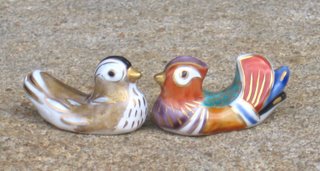:::::::::::::::::::::::::::::::::::::::::::::::::::::::::::::::::::::::::::::::::::::::::::::::::::::
Kamo no Choomei 鴨長明 Kamo no Chomei
Kamo no Chōmei
( 1153 or 1155–1216)
a Japanese author, poet (in the waka form), and essayist.
He witnessed a series of natural and social disasters, and, having lost his political backing, was passed over for promotion within the Shinto shrine associated with his family. He decided to turn his back on society, take Buddhist vows, and became a hermit, living outside the capital. This was somewhat unusual for the time, when those who turned their backs on the world usually joined monasteries. Along with the poet-priest Saigyō he is representative of the literary recluses of his time, and his celebrated essay
Hōjōki ("An Account of a Ten-Foot-Square Hut") is representative of the genre known as "recluse literature" (sōan bungaku).

Born with the name Kamo no Nagaakira,
Life as a recluse
Chōmei's specific reasons for becoming a recluse are unclear, but a string of bad luck, specifically the death of his father and his inability to fill the position left behind by him, may have caused him to leave court life. He spent the next five years in Ohara, at the foot of Mount Hiei, but considered his time here as a failure, and so he moved to Hino, in the hills southeast of the capital, where he spent the rest of his life. The design of the hut he built in Hino was inspired by the dwelling of the Buddhist recluse Vimalakirti. The Vimalakirti Sutra exerted a profound influence on Hōjōki. Chōmei wrote Mumyōshō, Hosshinshū, and Hōjōki while living as a recluse. Though Chōmei states in Hōjōki that he never left his dwelling, a separate account states that he made a trip to Kamakura to visit the shogun and poet Minamoto no Sanetomo.
During his later life, Chōmei maintained a socio-historical perspective that was rare in court poets of the time. The accounts of chaos in the capital in the first part of Hōjōki suggest Chōmei's social interests, and he contrasts them with his peaceful life as a Buddhist in reclusion. His account coincides with the spread of Buddhism to the general populace; and his careful depictions of the natural surroundings of his hut and of the natural and social disasters in the capital form a unique microscopic and macroscopic view of life during a violent period of transition. Attention to nature and self-reflection characterize the genre of recluse literature, and Chōmei was its pre-eminent practitioner.
Chōmei's died the tenth day of the intercalary six-month of 1216,
when he asked Zenjaku to complete a koshiki for him.
© More in the WIKIPEDIA !
:::::::::::::::::::::::::::::::::::::::::::::::::::::::::::::::::::::::::::::::::::::::::::::::::::::
... the poet-priest Kamo no Chōmei explains that unlike prose, a poem “possesses the power to move heaven and earth, to calm demons and gods,”because, among other attributes,
“it contains many truths in a single word ”
(hito kotoba ni ōku no kotowari o kome)
Mantra, Dharani, Waka and Japanese Poetry
. Mantra of Fudo Myo-Oo 不動明王の真言 .
:::::::::::::::::::::::::::::::::::::::::::::::::::::::::::::::::::::::::::::::::::::::::::::::::::::
yuugen 幽玄 yugen
The qualities deemed essential to the style [of yugen] are overtones that do not appear in the words alone and an atmosphere that is not visible in the configuration of the poem It is like the situation of a beautiful woman who, although she has cause for resentment, does not give vent to her feelings in words, but is only faintly discerneded at night, perhaps to be in a profoundly distressed condition. The effect of such a discovery is far more painful and pathetic than if she had exhausted her vocabulary with jealous accusations or made a point of wringing out her tear-drenched sleeves to one's face
Mumyooshoo 無名抄(むみょうしょう) Mumyosho
. WKD : Yugen (yuugen 幽玄) .
:::::::::::::::::::::::::::::::::::::::::::::::::::::::::::::::::::::::::::::::::::::::::::::::::::::

Hoojooki、Hōjōki 方丈記 Hojoki
Though the river's current never fails, the water passing, moment by moment, is never the same. Where the current pools, bubbles form on the surface, bursting and disappearing as others rise to replace them, none lasting long. In this world, people and their dwelling places are like that, always changing.
魚は水に飽かず、魚にあらざればその心を知らず。
鳥は林をねがふ。鳥にあらざれば其心を知らず。
If you are doubtful about what I am saying,
look at the situation of the fish and the birds.
Fish are always in the water, yet they don't become bored with the water.
If you are not a fish you probably can't understand that feeling.
Birds hope to live in the forest.
If you are not a bird, you probably can't understand that motive.
My feeling about my tranquil residence is of the same kind.
Who can understand this if they haven't tried it?
Read the full text here:
source : www.washburn.edu
:::::::::::::::::::::::::::::::::::::::::::::::::::::::::::::::::::::::::::::::::::::::::::::::::::::
ゆく河の流れは絶えずして、しかももとの水にあらず
yuku kawa no nagare wa taezushite shikamo moto no mizu ni arazu
The flow of the river is endless
and its water is never the same.
. - Moto no Mizu もとの水 - 句集 - A Hokku Collection - .
Poems attributed to Matsuo Basho. Published in 1787.
:::::::::::::::::::::::::::::::::::::::::::::::::::::::::::::::::::::::::::::::::::::::::::::::::::::
H A I K U
魚鳥の心は知らず年忘れ
uo tori no kokoro wa shirazu toshi wasure
how fish and birds
feel at heart, I do not know -
the year-end party
Tr. Ueda
MORE -
. Matsuo Basho 松尾芭蕉 - Archives of the WKD .
:::::::::::::::::::::::::::::::::::::::::::::::::::::::::::::::::::::::::::::::::::::::::::::::::::::
. Daruma Pilgrims - TOP - .
[ . BACK to WORLDKIGO TOP . ]
[ . BACK to DARUMA MUSEUM TOP . ]
:::::::::::::::::::::::::::::::::::::::::::::::::::::::::::::::::::::::::::::::::::::::::::::::::::::







No comments:
Post a Comment